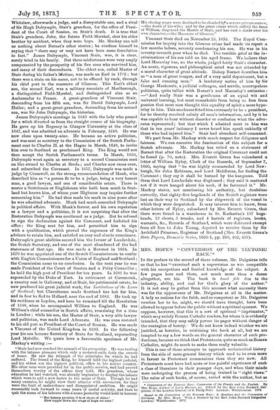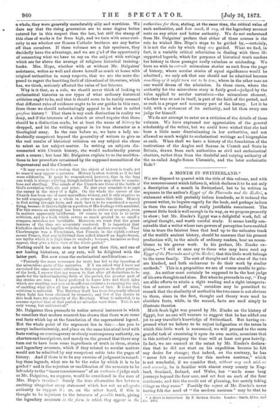AIRS. HOPE'S " CON VERSION OF THE TEUTONIC RACE."*
IN the preface to the second of these volumes, Mr. Dalgairns tells us that he has " exercised such a supervision as was compatible with his occupations and limited knowledge of the subject. A few pages here and there, not much more than a dozen altogether, are his. The hook is bond fide due to the industry, ability, and zeal for God's glory of the author." It is not easy to gather from this account what necessity there was for the appearance of Mr. Dalgairns at all in the matter. A lady so zealous for the faith, and so competent as Mr. Dalgairns vouches her to be, might, we should have thought, have been allowed to appear before the public without a spiritual sponsor. We suppose, however, that this is a sort of spiritual " imprimatur," which may satisfy Roman Catholic readers, for whom it is evidently intended, that they may safely peruse its pages without danger of the contagion of heresy.' We do not know indeed whether we are justified, as heretics, in criticising the book at all, but we are tempted to say a few words on the general character of such pro- ductions, because we think that Protestants, quite as much as Roman. Catholics, might do much to make them really valuable.
This is one of those attempts to approach ecclesiastical history from the side of mere general history which used to be even more in favour in Protestant communions than they are now. All Protestants must have had more or less painful experience of such• a class of literature in their younger days, and when their minds were undergoing the process of being trained in " right views." The value of such books, of course, varied with the author, but as
• Conversion of the Teutonic Race: Conversion of the Franks and the English. By Mrs. Hope, Author of Early Martyrs, &c. Edited by the Bev. John Bernard Dal- gairns, of the London Oratory of S. Philip Neri. London: Washbonrne. 1872.
Segue: to the Conversion of the Teutonic Rare: 8. Boniface and the Conversion of Germany. By Mrs. Hope. With a Preface by the BAY. John Bernard DaJokna London: Washbourne. 1872.
a whole, they were generally unendurably silly and worthless. We • dare say that the rising generation are to some degree better catered for in this respect than the last, but still the stamp of this class of works is far from high, and we turn with some curi- osity to see whether our Roman Catholic brethren are any better off than ourselves. If these volumes are a fair specimen, they decidedly have the advantage, and we are glad of the opportunity of connecting what we have to say on the subject with writings which are far above the average of religious historical training- books. Mrs. Hope, whether with or without Mr. Dalgairns' assistance, writes so well and shows herself so much at home with original authorities in many respects, that we are the more dis- posed to regret the besetting fault of this school of literature, which has, we think, seriously affected the value of her labours.
Why is it that, as a rule, we should never think of looking to ecclesiastical histories as our types of what ordinary historical criticism ought to be, and that it should seem to be tacitly assumed that different rules of evidence ought to be our guides in this case, from those we should unhesitatingly appeal to in what is called profane history ? That there is any such distinction in reality we deny, and if the interests of a church or creed require that there should be a distinction made, let at least the name of history be dropped, and let the writing appear in its true character as a theological essay. In the case before us, we have a lady un- doubtedly competent beyond the generality of writers to give us the real results of historical criticism on any subject she chose to select as her subject-matter. In writing on subjects dis- connected with Church history, she would undoubtedly pursue such a course ; but hear Mr. Dalgairns explain to us the modifica- tions in her procedure occasioned by the supposed necessities of the Supernatural and the Church :- "It may seem to be a truism that the object of history is truth, yet to some it may appear a paradox. History is often written as if its end were edification. It must be remembered, however, that in the long run truth is always edifying, though isolated facts may often be scanda- lous and startling. The annals of the Church are those of the battle of God's revelation with sin and error. To slur over scandals is to omit the enemy in the story of a fight. On the whole tho career of the Church has been one of most marvellous victory, and it only requires to be told courageously as a whole in order to make this clear. History is God acting through facts, and each fact is to be considered a sacred thing, because it throws light en a portion of His dealings with mankind. For this reason an attempt has been made to arrive at accuracy, even in matters apparently indifferent. Of course to say this is to invite criticism, and in a book which covers so much ground in so small a compass, mistakes are inevitable. However, we trust that the great features of the time are accurately rendered. It is important that Catholics should be familiar with the results of modern research. That Charlemagne was a Frenchman, that Francia in the eighth century meant France, that any individual then called himself an Anglo-Saxon, are myths which it is high time to explode ; because, harmless as they appear, they give a false view of the whole period."
Nothing could be more true or better put than this, and one of our leading historians, at any rate, will be delighted with the latter part. But now come the ecclesiastical modifications:— "Precisely the same reverence for truth has led to the insertion of the miraculous parts of the narrative. If I am asked why I have not exercised the same minute criticism in this respect as in other portions of the book, I answer that my reason is, that after all deductions to be made for the indiscriminating faith of the period, the greater part of the stories are true. I have preferred to leave here and there tales which are startling and rest on insufficient evidence, to running the risk of omitting what after all has probably a basis of fact. It is not that criticism is unlawful. The Breviary itself has been frequently altered when light has been obtained by research; and few of the stories in this book have the authority of the Breviary. What is unlawful, is to assume apriori that at that period no miracles were done. This is not only wrong, but unhistorical."
Mr. Dalgairns then proceeds to notice several instances in which be considers that modern research has shown that there wae some real facts which lay at the foundation of the supernatural legend. But the whole point of the argument lies in this :—Are you to accept indiscriminately, and place on the same historical level with facts resting on contemporary or closely contemporary authority, on charters and inscriptions, and merely on the ground that there may turn out to have been some ingredients of truth in them, stories and legendary accounts, which if they related to secular matters would not be admitted by any competent critic into the pages of history. And if there is to be any exercise of judgment in record- ing these legends, what are to be the rules by which it is to be guided ? and is the rejection or modification of the accounts to be left solely to the " inner consciousness" of an authorised judge such as Mr. Dalgairns, we suppose, would be considered in the case of Mrs. Hope's treatise ? Surely the true alternative lies between omitting altogether every statement which has not an adequate authority to support it ; or, on the other baud, if this is thought to be injurious to the interests of possible truth, giving the legendary accounts in the form in which they appear in the authorities for them, stating, at the same time, the critical value of such authorities, and how much, if any, of the legendary account rests on any other and better authority. We do not understand from Mr. Dalgairns' preface that either of these courses is the rule he wished Mrs. Hope's steps to be guided by,—certainly, it is not the rule by which they are guided. What we find, in fact, is a variable critical eclecticism in dealing with these ill- supported legends, which for purposes of historical truth renders her history in these passages really valueless or misleading. We have no wish to extrude miraculous stories as such from the page of history, where secular stories of equal significance would be admitted ; we only ask that one should not be admitted because something of it might turn out to be true, where in the other case no one would dream of the admission. In those cases, where the authority for the miraculous story is fairly good—judged by the rules applied to secular narratives—the miraculous element, whether true or not in itself, is part of the faith of the period, and as such is a proper and necessary part of the history. Let it be told, with a statement of its authority, and let then every one judge for himself.
We do not attempt to enter on a criticism of the details of these volumes. We have expressed our appreciation of the general scholarship of the writer, but we could have wished that she had been a little more discriminating in her authorities, and not allowed so much weight to ecclesiastical writings and biographies as such. When shall we have a history of the foundation of the institutions of the Angles and Saxons in Church and State in Britain, drawn from such authorities as civil and ecclesiastical charters, rather than from the doubtful and varying authority of the so-called Anglo-Saxon Chronicle, and the later ecclesiastic Bede ?



































 Previous page
Previous page